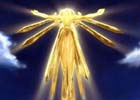Fafner in the Azure: Dead Aggressor
| Soukyuu no Fafner: Dead Aggressor | ||
| Also Known As: Fafner | ||
| Genre: Drama/Science Fiction | ||
| Format: 25 episodes | ||
| Allegiance: Xebec | ||
| Director: Habara Nobuyoshi | ||
| Vintage: 2004 | ||
| Intelligence Agency Report by: Tremolo | ||
| “Anata wa soko ni imasu ka – are you there?”The youth of Tatsumiya Island always believed they had quiet, ordinary lives until the attack of the Festum, extraterrestrial intelligent life forms intent on assimilating all humans. With the once peaceful island now transformed into a high-tech military fortress – the last line of defence against the hostile alien enemy, Kazuki Makabe and his friends are shocked to learn that only they can pilot the humanoid Fafnerrobots, unstable weapons decisive in what may be the final battle to save all mankind. | ||
|
|
||
| Field Agent Report by: Tremolo | ||
| Plot Characters Impact Visual Audio |
7.00 7.50 9.00 9.50 9.25 |
|
| Overall | 8.75 | |
| (not an average) | ||
Fafner in the Azure is undoubtedly the best mecha series of 2004, although admittedly it doesn’t have very much competition. That aside, Fafner is very much deeply grounded in the genre of character-driven mecha anime that Neon Genesis Evangelion essentially revolutionised back in 1995 and was then further improved upon by Vision of Escaflowne and the more recent RahXephon. Whilst it is becoming increasingly hard to be impressed by this so called sub-genre considering just how many poor imitations and knock-offs there have been, Fafner nonetheless manages to rise above most of the cliché and surprise.
One thing that has to be made clear is that Fafner positively wallows in melodrama. Anime usually tends to be overly dramatic at the best of times, and this series is no exception to the rule. On the plus side though, the situations the characters find themselves in and the things that happen to them more than excuse the strong emotion on display. Rather than being pointlessly over-the-top for the sake of it, the series manages to succeed in making you care about these flawed individuals and as such delivers some genuinely shocking and moving moments as the series progresses. It is very hard to not immerse yourself in what is going on. Better still, the series manages to pull itself out of the old anime trap of having too many characters and having nothing for them to do by giving each of them their own spot in the limelight at various, natural points of the narrative. Naturally there is angst on display, but the series never dwells too long on numerous teenage neuroses and handles both the characters and the story with aplomb.
Thankfully, the visuals never once let the story down, with Xebec’s handle on the CG elements coming off as far smoother and more effective than anything from GONZO. The animation is simply gorgeous, with its vivid backgrounds, glorious shades of blue and Hirai Hisashi’s peculiar but attractive character designs coming off much better than they have in other series. Not only does it look incredible, but it sounds fantastic as well. The orchestral soundtrack is magnificently bombastic and overblown – fitting the mood perfectly, whilst the opening and ending songs (among others) from the group angela are simply fantastic, epic compositions that are very hard to skip.
However, it is sadly the previously mentioned mecha genre cliché that are the only things that hampers the series in any significant way. The first few episodes come across as extremely typical, with the writing coming off as rather clunky. Fortunately it improves greatly when another writer takes over, pushing the story into a different and much more interesting direction. The characters also come with a sense of déjà vu, with the flawed teenage hero, the gruff, controlling organisation head, the bishounen with a tragic past… Nevertheless, the series grows stronger as each episode goes by, truly upping the ante in its explosive second half and only letting up at its epic, eminently satisfying finale.
Whilst Neon Genesis Evangelion undoubtedly paved the way for Fafner, Fafner never forgets that it’s trying to tell its own very different story in its own way. With its fantastic visuals, music and dramatic storytelling techniques, Fafner in the Azure: Dead Aggressor is an emotional roller coaster ride that has much to offer both fans and non fans of the auspicious mecha genre.




